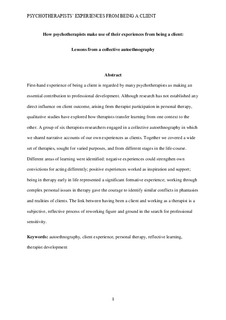| dc.contributor.author | Råbu, Marit | |
| dc.contributor.author | Mcleod, John | |
| dc.contributor.author | Haavind, Hanne | |
| dc.contributor.author | Bernhardt, Ida S. | |
| dc.contributor.author | Nissen-Lie, Helene A | |
| dc.contributor.author | Moltu, Christian | |
| dc.date.accessioned | 2020-02-10T07:39:07Z | |
| dc.date.available | 2020-02-10T07:39:07Z | |
| dc.date.created | 2019-09-23T17:20:37Z | |
| dc.date.issued | 2019 | |
| dc.identifier.citation | Råbu, M., McLeod, J., Haavind, H., Bernhardt, I. S., Nissen-Lie, H. & Moltu, C. (2019). How psychotherapists make use of their experiences from being a client: Lessons from a collective autoethnography. Counselling Psychology Quarterly, 1-20. | nb_NO |
| dc.identifier.issn | 0951-5070 | |
| dc.identifier.uri | http://hdl.handle.net/11250/2640545 | |
| dc.description | This is an Accepted Manuscript of an article published by Taylor & Francis in Counselling Psychology Quarterly on 4 Oct 2019, available online: https://www.tandfonline.com/doi/full/10.1080/09515070.2019.1671319 | nb_NO |
| dc.description.abstract | First-hand experience of being a client is regarded by many psychotherapists as making an essential contribution to professional development. Although research has not established any direct influence on client outcome, arising from therapist participation in personal therapy, qualitative studies have explored how therapists transfer learning from one context to the other. A group of six therapists-researchers engaged in a collective autoethnography in which we shared narrative accounts of our own experiences as clients. Together we covered a wide set of therapies, sought for varied purposes, and from different stages in the life-course. Different areas of learning were identified: negative experiences could strengthen own convictions for acting differently; positive experiences worked as inspiration and support; being in therapy early in life represented a significant formative experience; working through complex personal issues in therapy gave the courage to identify similar conflicts in phantasies and realities of clients. The link between having been a client and working as a therapist is a subjective, reflective process of reworking figure and ground in the search for professional sensitivity. | nb_NO |
| dc.language.iso | eng | nb_NO |
| dc.publisher | Taylor & Francis | nb_NO |
| dc.subject | autoethnography | nb_NO |
| dc.subject | client experience | nb_NO |
| dc.subject | personal therapy | nb_NO |
| dc.subject | reflective learning | nb_NO |
| dc.subject | therapist development | nb_NO |
| dc.title | How psychotherapists make use of their experiences from being a client: Lessons from a collective autoethnography | nb_NO |
| dc.type | Journal article | nb_NO |
| dc.type | Peer reviewed | nb_NO |
| dc.description.version | acceptedVersion | nb_NO |
| dc.source.journal | Counselling Psychology Quarterly | nb_NO |
| dc.identifier.doi | 10.1080/09515070.2019.1671319 | |
| dc.identifier.cristin | 1727992 | |
| cristin.unitcode | 203,11,1,0 | |
| cristin.unitname | Institutt for helse- og omsorgsvitskap | |
| cristin.ispublished | true | |
| cristin.fulltext | postprint | |
| cristin.qualitycode | 1 | |
